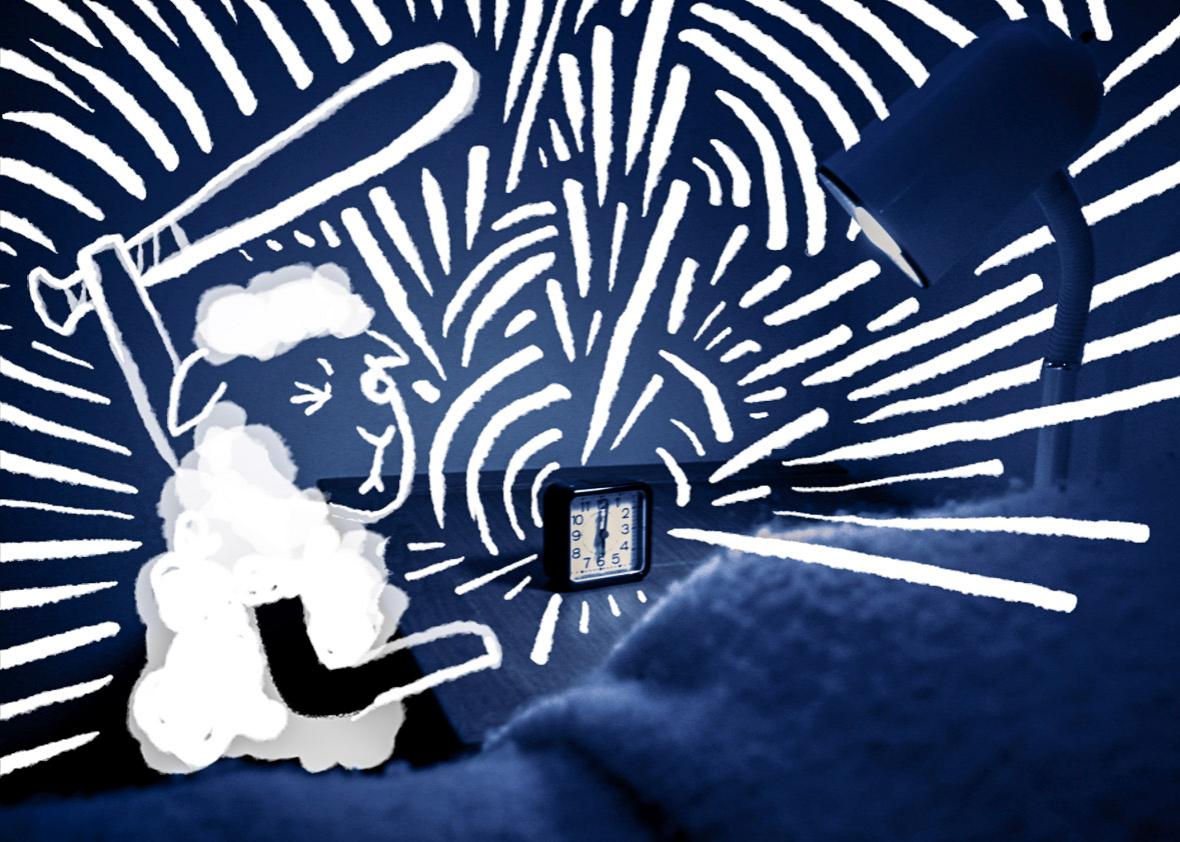For most of history, people didn’t have to wake up at a particular time. They just had to wake up early enough to get their work done while the sun was up. If you were a farmer—and you probably were—you didn’t have a boss who would get mad at you if you weren’t at work by 9 a.m. In fact, you probably didn’t know when 9 a.m. was—you just knew when it was time to milk the cows.
That changed during the Industrial Revolution. As labor historian E.P. Thompson wrote in his groundbreaking 1967 paper “Time, Work-Discipline, and Industrial Capitalism,” “The first generation of factory workers were taught by their masters the importance of time.” A factory is useless if all the laborers waltz in when they’re good and ready, so factory owners found ways to get everybody up for the morning shift. Factories blew loud whistles to wake up workers living nearby and to mark the beginnings and ends of shifts. In Industrial-era Britain, men known as “knocker-ups” were employed to rap on people’s windows to wake them up in time for work. By 1876, when the Seth Thomas Clock Company patented the mechanical, adjustable bedside alarm clock, the marketplace was ready for this invention. By now, waking up had nothing to do with the sun’s rise or the seasonal demands of agriculture and everything to do with an artificially imposed schedule of production whose rigidity never wavered.
Most of us no longer depend on other people to wake us up, but the way modern Americans wake up—to a loud, unpleasant noise—has more in common with the way 19th-century factory workers woke up than with the way our agrarian forebears woke up. It’s difficult to imagine modern capitalism without the alarm clock. Whether you’re taking over a shift, striding into a meeting, or just logging into Slack, you need to start work on time—which means you need to wake up on time.
You don’t need a sleep scientist to tell you that getting jerked out of deep sleep by artificial means is not ideal. As technology and our understanding of the sleep cycle have advanced, alarm clocks have taken new forms, each one promising to make awakening easy, or at least less terrible. Most fitness tracker wristbands come with built-in sleep trackers and vibrating alarms. You can subscribe to Sleeprate, a program that assesses your sleep habits, monitors your heart rate, and promises to clean up your sleep hygiene to make waking up easier. Sense, a system that tracks your sleep patterns via a detector attached to your pillow, in addition to monitoring bedroom “noise, light, temperature, humidity and particles in the air,” raised more than 24 times its $100,000 funding goal on Kickstarter in 2014. (Despite the flooded marketplace, most manufacturers still haven’t managed to perfectly duplicate the technology of sleep labs—there’s a great deal of variation in how well these apps and gadgets reflect your sleep patterns.) There are also a plethora of smartphone apps offering clever ways to shake off grogginess, like the Mathe Alarm Clock, which makes you solve random math problems to silence the alarm.
As someone who is terrible at rousing herself, I’ve tried many of these modern options, including one of the smartphone apps that allegedly monitors your sleep patterns and wakes you up when you’ve reached a phase of light sleep, a dawn simulator alarm lamp that slowly gets brighter and brighter as it approaches a preset wake-up time, and the SpinMe Alarm Clock, a smartphone app that requires you to stand up and spin around slowly for two full revolutions to turn off the sound, to discourage you from turning off the alarm and going back to sleep. Sadly, none of these have cured me of my habit of hitting the snooze button five or six times before miserably flumping out of bed. (I’m thinking of trying motorized window shades on a timer to flood my bedroom with sunlight next. Wish me luck!)
What most of the alarm clocks in this new generation have in common is that they promise to make waking up feel natural and easy, as though we were farmers being gently roused by the light of the rising sun. Perhaps then it’s no surprise that some biohackers have taken this notion further by training themselves to wake up at the right time without using alarm clocks at all and then bragging about it to the unenlightened masses who are still enslaved to our alarms. Maybe, as the dangers of inadequate sleep become wider known, more of us will throw out our alarm clocks and try to get back in touch with our circadian rhythms.
I doubt we will reject the utility of predetermining our wake-up time any time soon, though. More likely, alarm clock manufacturers will continue to pursue the holy grail of waking up: an alarm that effortlessly brings our bodies’ rhythms in line with the demands of the market, rather than the other way around.
Read more from The Drift, Slate’s pop-up blog about sleep.
